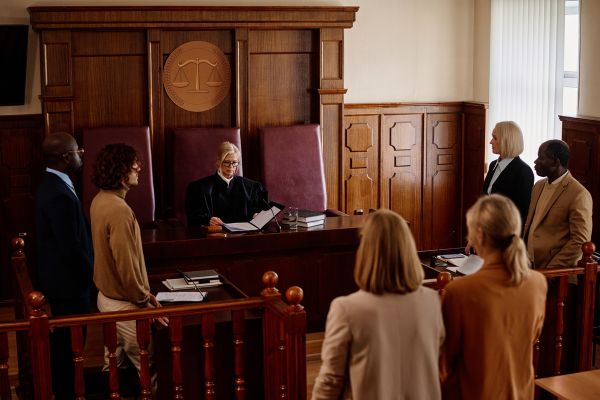Application Of Forensic Psychology To The Criminal Justice System
Forensic psychology applies psychological expertise to criminal justice proceedings, with specialists conducting mental health evaluations that directly influence court decisions, sentencing outcomes, and treatment recommendations for defendants with psychological conditions.
Key functions of forensic psychology in the criminal justice system:
- Court-ordered evaluations: Assessing defendant competency to stand trial and mental state during alleged crimes
- Evidence-based reports: Providing scientific documentation that judges and juries use to understand criminal behavior
- Alternative sentencing: Recommending treatment programs instead of incarceration for mentally ill defendants
- Expert testimony: Translating complex psychological findings into understandable legal evidence
- Risk assessments: Evaluating potential danger to society and likelihood of reoffending
Forensic psychology differs from clinical psychology by prioritizing legal questions over treatment, with reports becoming public court evidence rather than confidential medical records. These professionals evaluate serious mental illnesses (schizophrenia, bipolar disorder), personality disorders (antisocial, borderline), and substance abuse impacts on criminal behavior. Their comprehensive assessments include standardized psychological tests, clinical interviews, family history reviews, and criminal background analysis. Courts increasingly rely on forensic psychology evidence to make informed decisions that balance public safety with appropriate mental health interventions, often resulting in rehabilitation-focused outcomes rather than traditional incarceration.

What Forensic Psychology Field Means
Forensic psychology mixes medical mind science with crime investigation work in fascinating ways. The American Psychology Association explains forensic psychology as using clinical skills in legal cases. Forensic psychology experts use scientific principles and research to explain why people commit crimes. These professionals apply psychological theories to understand criminal behavior patterns and mental states. They conduct thorough assessments using standardized tests and clinical interviews with defendants. Forensic psychology specialists also analyze how mental illness affects decision-making during criminal acts. Their expertise helps legal professionals understand the psychological factors behind various criminal behaviors. This field requires extensive knowledge of both psychology principles and legal system requirements.
Forensic psychology helps courts decide if someone should face punishment or receive help instead. Florida law provides clear rules for using forensic psychology in court cases nationwide. Our society has become more complex, making emotional well-being important in understanding human actions. FC Psych Experts bridge the gap between mental health understanding and legal requirements effectively. They translate complex psychological concepts into language that judges and juries can understand easily. These professionals provide objective evaluations that inform critical legal decisions about defendants’ futures. Their work ensures that mental health factors receive proper consideration in criminal justice proceedings. Psychology continues evolving as new research enhances our understanding of criminal behavior according to the National Institute of Justice.
How Forensic Psychology Differs From Regular Mental Health Checks
Forensic psychology and clinical psychological evaluations share similar evaluation techniques but serve completely different purposes. Understanding these differences helps people know what to expect from each type of assessment. Both fields require extensive training, but they operate under different rules and guidelines.
The relationship between psychologist and client varies significantly depending on the evaluation type being conducted. Clinical settings focus on healing and treatment, while forensic settings prioritize legal questions and evidence gathering.
Key differences between forensic psychology and regular mental health evaluations include:
- Clinical psychology clients choose their own evaluations and control treatment decisions voluntarily
- Forensic psychology assessments get ordered by judges or requested by attorneys without client choice
- Regular therapy services create supportive environments focused on patient healing and emotional wellbeing
- Forensic psychology evaluations often create adversarial situations with opposing legal interests at stake
- Clinical psychologists maintain strict confidentiality rules to protect patient privacy and trust
- Forensic psychology reports become court evidence that lawyers and judges can access freely
- Traditional therapy sessions aim to help clients improve their mental health over time
- Forensic psychology evaluations focus on answering specific legal questions for court proceedings
- Clinical psychology treatments continue long-term to support ongoing patient mental health needs
- Forensic psychology assessments typically end once the legal evaluation report gets completed
These fundamental differences affect how psychologists approach their work in each setting. Forensic psychologists must balance therapeutic skills with legal requirements and courtroom testimony responsibilities. Their primary duty involves providing objective assessments rather than advocating for client treatment preferences. The APA Ethics Code provides guidance on maintaining professional boundaries in both settings.
When Courts Need Forensic Psychology Evaluations
Courts need forensic psychology evaluations when complex legal questions arise about mental fitness. Only trained forensic psychologists certified by the American Board of Forensic Psychology can answer questions about insanity or mental ability. The forensic psychologist gets hired to check the accused person’s mental and emotional condition.
The expert conducts detailed interviews with the defendant and important people around them. They talk to family members, friends, witnesses, police officers, and lawyers involved. The forensic psychologist also reviews school records, medical history, and past criminal background information. They run special mental tests and give professional opinions to help answer legal questions. Neuropsychological evaluations determine the person’s mental state when the crime happened or didn’t happen.
Lawyers can also request forensic psychology evaluations when they think it helps their case. Judges have the power to order defendants to get forensic psychology checkups before making final decisions. The Department of Justice provides federal guidelines for these evaluations in criminal proceedings.
Where Forensic Psychology Services Get Used
Forensic psychology services play vital roles across multiple legal and social settings today. These specialized professionals bring unique expertise to complex situations that require both psychological knowledge and legal understanding. Their work extends far beyond traditional courtroom settings into community-based programs and institutions.
The main areas where forensic psychology experts provide essential services include:
- Child custody evaluations during divorce proceedings and family court disputes
- Competency assessments to determine if defendants can participate in trial proceedings
- Threat evaluations in schools to assess potential violence risks and safety concerns
- Death notification support for families dealing with sudden loss and grief
- Post-traumatic stress disorder evaluations for first responders and military personnel
- Treatment program assessments for adult offenders in correctional rehabilitation facilities
- Juvenile offender evaluations to develop appropriate intervention strategies for young criminals
These services operate in diverse locations including courtrooms, police stations, and schools. Mental health centers, correctional facilities, and social service agencies also utilize expert forensic psychologists . Immigration evaluations represent another growing area where psychological assessments inform legal decisions. The field continues expanding as society recognizes the importance of psychological factors in legal matters. Forensic psychologists adapt their skills to meet emerging challenges in our justice system. Contact us to learn more about available forensic services.

How Forensic Psychology Reports Influence Court Outcomes
Forensic psychology reports serve as powerful tools that shape legal decisions every day. These detailed documents provide scientific evidence that helps courts understand complex mental health issues. Judges and attorneys rely heavily on these professional assessments to make informed choices about cases. The comprehensive nature of these reports gives legal professionals crucial insights into defendant behavior patterns. Courts depend on this expert analysis to navigate complicated situations involving mental health and criminal responsibility.
The impact of forensic psychology reports extends beyond simple recommendations to actual case outcomes. They can determine whether someone goes to prison or receives mental health treatment instead. These reports often become the deciding factor in challenging legal situations involving mental fitness. Legal professionals use this information to argue for appropriate sentences that match individual circumstances. The scientific backing of forensic evaluations helps courts make fair decisions based on evidence. Many defendants receive better outcomes when these professional assessments highlight mental health factors. Courts increasingly recognize that psychological evidence leads to more effective justice solutions for everyone involved. The American Academy of Forensic Psychology provides training standards ensuring report quality.
What Information Gets Included in Forensic Psychology Reports
Forensic evaluation reports contain comprehensive information about a person’s mental and emotional condition. The psychologist includes detailed background history covering childhood experiences, education, and previous medical treatments. Family history of mental illness and substance abuse problems also get documented thoroughly. Attachment and bonding assessments may be included when relevant to the case.
Test results from standardized psychological assessments make up important sections of these reports. The expert explains what specific mental conditions they discovered during their evaluation process. They describe how these conditions might affect the person’s ability to understand right from wrong. Psychoeducational testing results may supplement the evaluation when cognitive abilities are in question.
Clinical interview findings provide crucial insights into the defendant’s current mental state and thinking patterns. The psychologist documents any signs of mental illness, personality disorders, or cognitive impairments they observed. Risk assessment conclusions help courts understand potential dangers the person might pose to society. These comprehensive reports follow guidelines from the American Board of Professional Psychology.
How Judges and Juries Use Forensic Psychology Evidence
Judges use forensic psychology reports to make critical decisions about competency and sentencing options. They rely on expert opinions to determine if defendants can participate meaningfully in their trials. These reports help judges understand whether mental illness played a role in criminal behavior. Personal or emotional injury evaluations provide additional context in civil cases.
Juries receive simplified explanations of complex psychological concepts through expert testimony during trials. Forensic psychologists present their findings in language that everyday people can easily understand and apply. The expert helps jury members grasp how mental health issues might affect criminal responsibility. The Florida Association of Psychology provides state-specific guidelines for expert testimony.
Courts consider these psychological evaluations when deciding between punishment and treatment-focused approaches to justice. The reports influence whether someone gets sent to prison or a mental health facility. They also affect parole decisions and supervised release conditions for offenders with mental health needs. Family therapy recommendations may accompany sentencing in cases involving domestic issues.
Why Forensic Psychology Recommendations Change Sentencing Decisions
Forensic psychology recommendations carry significant weight because they provide scientific backing for legal choices. Courts recognize that mental health experts have specialized training to evaluate complex psychological conditions. Their professional opinions help ensure that justice considers both legal requirements and human welfare needs. Learn more about us and our approach to forensic evaluations.
These recommendations often lead to alternative sentencing options that focus on rehabilitation rather than punishment. Mental health treatment programs become more likely when forensic psychology reports support this approach. Courts may order supervised community service instead of incarceration based on expert recommendations. Co-parenting counseling might be mandated in family court cases.
The scientific credibility of forensic psychology gives courts confidence in making difficult sentencing decisions. Judges can justify their choices by pointing to professional psychological assessments and expert testimony. This evidence-based approach helps ensure that sentences match both the crime committed and the person’s mental health needs. Cognitive behavioral therapy programs often result from these recommendations. The APA continuing education guidelines ensure experts maintain current knowledge.
Conclusion
Forensic psychology has revolutionized how our justice system approaches criminal cases involving mental health concerns. These specialized experts provide crucial insights that help courts balance legal requirements with individual psychological needs effectively. Their comprehensive evaluations ensure that defendants receive fair treatment while protecting public safety through evidence-based assessments. The field continues advancing with new research methods that improve accuracy in criminal behavior analysis. Courts increasingly recognize that mental health expertise leads to better outcomes for both defendants and society.
The future of forensic psychology looks promising as more legal professionals embrace these scientific approaches. Technology and improved assessment tools will enhance the precision of psychological evaluations in courtrooms nationwide. Forensic psychology experts will continue adapting their methods to address emerging challenges in criminal justice. Reunification counseling services exemplify evolving forensic applications in family court. Their vital contributions ensure that our legal system considers the complete picture of human behavior. This growing field remains essential for creating more effective and compassionate justice solutions. The American Psychology-Law Society continues advancing research and practice standards in this crucial field.
FAQs
What does a forensic psychologist do in criminal cases?
Forensic psychologists evaluate defendants’ mental health and competency to stand trial in court proceedings. They provide expert testimony and written reports that help judges make informed sentencing decisions.
How long does a forensic psychology evaluation take to complete?
Most forensic psychology evaluations take several weeks to finish due to comprehensive testing requirements. The process includes interviews, psychological tests, record reviews, and detailed report writing procedures.
Can forensic psychology evaluations help reduce prison sentences for defendants?
These evaluations can lead to alternative sentencing options like mental health treatment instead of incarceration. Courts often consider psychological factors when deciding between punishment and rehabilitation-focused approaches to justice.
What training do forensic psychologists need to work in criminal cases?
Forensic psychologists need doctoral degrees in psychology plus specialized training in legal system requirements. They must also complete supervised experience in forensic settings and ongoing professional development courses.
Do forensic psychology reports always favor the defendant in criminal trials?
Forensic psychology reports remain objective and present findings based solely on scientific evidence and assessment results. These professionals maintain neutrality and focus on answering specific legal questions rather than advocating.

